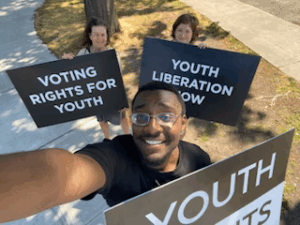A closeted youth rights supporter, and professor at MIT, Scott Aaronson, has made a bold attempt to come out of the closet by debating the absurd position of youth rights opponents. Specifically pointing out the lack of a credible argument against lowering the voting age. His post is impressive as he is well acquainted with our chief arguments and articulates them well (despite being over 12).
Yet despite recognizing there is no logical reason to oppose lowering the voting age he isn’t comfortable enough with the idea to fully embrace it. His reluctance to “out himself” does, I think, provide an interesting case study for our movement. Aaronson has identified our greatest challenge: we seem to lack momentum.
When out recruiting at events I tell all our volunteers a simple rule: sign your own name to the top of the sheet. No one wants to be the first to sign a blank sheet of paper. No one wants to be the first to write a book review on Amazon (interestingly discussed by Reid Hoffman on the Charlie Rose show). No one wants to join a cause they feel has a “negligible chance of winning” regardless of how needed or right it is. This fear of going first creates, as Aaronson said, a “generations-long delay between the inarguable and the acted-upon.” A fear he too succumbs to.
How do we overcome that? How do we avoid the image of being eccentric and Aspbergerish? (or rather, how do we attract people other than those who are eccentric and Aspbergerish?)
One strategy, actually, is that of Choose Responsibility who has put the drinking age debate on the map with their Amethyst Initiative. In this light it was a brilliant idea. A petition of a sizeable body of credible officials really broke the ice on the issue, allowing many fence sitters to feel less exposed by voicing support.
Some in NYRA have suggested doing something similar for the voting age. It is a good idea. In fact in his article, Aaronson says:
I know of only two famous intellectuals who’ve publicly advocated changing things: the educator John Holt and the quantum computing pioneer David Deutsch. Anyone know of others?
We certainly have our share of prominent supporters. Dennis Kucinich mentioned his support for lowering the voting age during a Democratic primary debate, Ralph Nader wrote an excellent article for Counter Punch calling for the voting age to be lowered, and Michael Moore also supports enfranchising youth. Unfortunately though, each of these figures carry with them political controversy and lack the mainstream appeal and clout of university presidents. But thanks to them, thanks to NYRA, and thanks to others around the world the call for lowering the voting age is slowly broadening its appeal.
Moving beyond the voting age, we have various credible figures who have supported at least some of our agenda. The biggest splash in recent years was “The Case Against Adolescence” by Robert Epstein. A book I strongly encourage Scott Aaronson to check out. Epstein made a strong appeal for a wide range of rights for young people. For those of us who are familiar with the works of John Holt, Richard Farson, Mike Males, Bob Franklin, and others Epstein’s book seems late to the party, but he had a very strong list of endorsements in his book jacket. Endorsements which demonstrate the unexpected support these ideas have in sometimes unusual corners.
The individuals who voiced support for Robert Epstein’s bold vision for the rights of youth:
– Albert Ellis, Ph.D., The Albert Ellis Institute
– Drew Pinsky, M.D., Co-Host, “Loveline”; Medical Director, Department of Chemical D ependency Services, Las Encinas Hospital, Pasadena, California
– Deepak Chopra, Life After Death: The Burden of Proof
– Dr. Joyce Brothers, author & columnist
– Frank W. Abagnale, Catch Me If You Can; president, Abagnale & Associates; author
– M. Scott Peck, M.D., The Road Less Traveled
– Alvin Toffler, Future Shock and Revolutionary Wealth
– Robert Coles, M.D., professor of psychiatry, Harvard University; recipient, Pulitzer Prize
– Leon Botstein, Jefferson’s Children: Education and the Promise of American Culture; president, Bard College; author
– Ellen Langer, Ph.D., Mindfulness; Professor of Psychology, Harvard University
– Jean Liedloff, The Continuum Concept
– George F. Will, columnist
– Mihaly Csikszentmihalyi, Flow; Professor of Management, Clairemont Graduate Center
– John Taylor Gatto, Dumbing Us Down and The Underground History of American Education; former New York City and New York State Teacher of the Year
– Gale A. Brewer, Member, New York City Council
– Suzanne Somers, actress and author
– Mariel Hemingway, actress
– Curtis Sliwa, Founder & President, Guardian Angels; co-host, ‘Curtis and Kuby in the Morning,’ WABC Radio, New York
– Buzz Aldrin, Ph.D. (Col., USAF, ret.), Apollo 11 Astronaut
Now, not all of the above list specifically said they agree with 100% of the ideas in Epstein’s book (I didn’t) but these issues are getting serious consideration from serious people. Others to add to the list include former Speaker of the House, Newt Gingrich, whose excellent article in Business Week echos Epstein’s call to end adolescence. Popular bloggers such as Glenn Reynolds, Matthew Yglesias, and Anya Kamenetz have come to our defense on a number of issues as well.
I have been at this for almost 10 years now and I can honestly see a positive trajectory for this movement in those years. This movement does have a non-negligible chance of winning. Every time a professor, lawmaker, columnist, media personality or college president steps up to voice support for the seemingly “eccentric” or “Aspbergerish” cause of youth rights, it becomes less fringe and more mainstream and encourages even more to come out in support.
As a small organization with few resources it seems that our most important role is to build more awareness of who actually has come out in support of us, and put their comments and ideas in the proper context of an overall revisioning of the role young people play in society. That way all these articles, blog posts, bills, and comments are seen not as isolated curiosities but as a part of something larger that is building steam.
Our other important role is to jump ahead a generation or two and start acting upon the ideas we all know are inarguable. Pass laws, repeal laws, overturn business policies, reform schools, and everything else that inches us further toward our goals. Each step shows that this cause not only makes sense, but is possible as well.
Hopefully Scott Aaronson will help our cause move one step further from the inarguable to the acted-upon.





